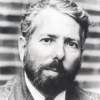Stanley Milgram

Stanley Milgram
Stanley Milgramwas an American social psychologist, best known for his controversial experiment on obedience conducted in the 1960s during his professorship at Yale. Milgram was influenced by the events of the Holocaust, especially the trial of Adolf Eichmann, in developing the experiment...
NationalityAmerican
ProfessionPsychologist
Date of Birth15 August 1933
CountryUnited States of America
authority compared induced laboratory light national produced profound slumber state system
The state produced in the laboratory may be likened to a light doze, compared to the profound slumber induced by the preponent authority system of a national government.
aggression anger behavior break execution given key lies nature relationship subjects themselves unable
The key to the behavior of subjects lies not in pent-up anger or aggression, but in the nature of their relationship to authority. They have given themselves to the authority; they see themselves as instruments for the execution of his wishes; once so defined, they are unable to break free.
leadership responsibility psychology
The disappearance of a sense of responsibility is the most far-reaching consequence of submission to authority.
long people authority
A substantial proportion of people do what they are told to do, irrespective of the content of the act, and without pangs of conscience, so long as they perceive that the command comes from a legitimate authority.
views essence wish
The essence in obedience consists in the fact that a person comes to view himself as an instrument for carrying out another person's wishes and he therefore no longer regards himself as responsible for his actions.
expectations focus acting
Although a person acting under authority performs actions that seem to violate standards of conscience, it would not be true to say that he loses his moral sense. Instead, it acquires a radically different focus. He does not respond with a moral sentiment to the actions he performs. Rather, his moral concern now shifts to a consideration of how well he is living up to the expectations that the authority has of him.
puppets firsts steps
And perhaps our awareness is the first step to our liberation.
social-behavior action realizing
Only in action can you fully realize the forces operative in social behavior. That is why I am an experimentalist.
actions authority callous demands good knuckle numbing people perform seen
With numbing regularity, good people were seen to knuckle under the demands of authority and perform actions that were callous and severe,